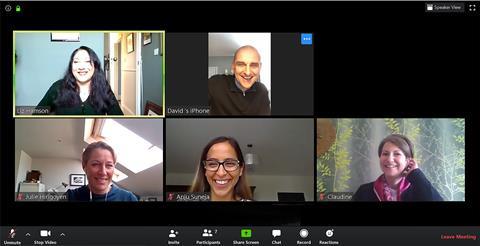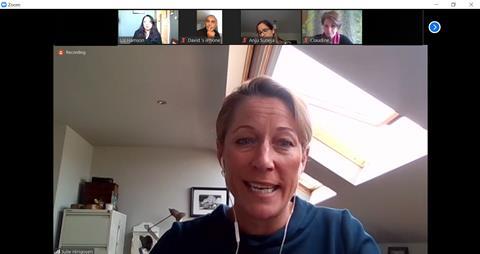Property Week’s Climate Crisis Challenge Zoom debate asks what the impact of the Covid-19 lockdown will be.

The Covid-19 pandemic should help rather than hinder the climate movement – but the industry needs to take care it does not take its eye off the ball in the way it did when the Global Financial Crisis struck in 2008.
This was the stark warning issued by the four panellists taking part in Property Week’s Climate Crisis Challenge Zoom debate held in collaboration with UK Green Building Council (UKGBC) last month.
In a lively conversation chaired by Property Week editor Liz Hamson, UKGBC, together with Climate Crisis Challenge partners Argent, Mishcon de Reya and Savills, discussed the impact of the pandemic so far, what will happen when we emerge from lockdown and what it means for net-zero-carbon targets.
The panel agreed that one of the few positives to emerge from the pandemic is that the lockdowns have reduced carbon emissions and underlined the correlation between reduced traffic pollution and a cleaner environment.
A report by the International Energy Agency published last month predicts the world will use 6% less energy this year than last year, and analysis by Carbon Brief also published last month suggests this could translate into an 8% fall in global CO2 emissions this year.
What Covid-19 has highlighted is how adaptable we can be
Claudine Blamey, Argent
While David Jackson, head of planning at Savills, acknowledged the downsides of lockdown, he said these were exactly the sort of energy and emission reductions the world needed if it is to achieve net-zero emissions by 2050.
“I think there are some lessons in the rapid adaptation that we have all had to buy into in a very short time in terms of the way we behave and have responded to the Covid-19 pandemic,” he said.
“Reduced travel, lower carbon emissions, increased connectivity and community focus – those elements might form the basis of our strategy on the other side of the lockdown in terms of maintaining the momentum of the climate agenda.”
Behavioural change
Claudine Blamey, head of sustainability and digital strategy at Argent, agreed.
“I think what Covid-19 has highlighted is how adaptable we can be, when push comes to shove, and how we really can change our behaviour,” she said, questioning the need for commuting to ever return to former levels when the lockdown has demonstrated much of the UK workforce can work from home.
“Taking pressure off congestion and taking pressure off transport means our air is cleaner, so let’s try and keep it that way,” she said.
It’s a great time for companies to focus on their worst-performing assets
Anju Suneja, Mishcon de Reya
Anju Suneja, partner at Mishcon de Reya, added that as well as showing remote working is possible, the lockdown was an ideal opportunity for companies to assess the impact of their portfolios on the climate.
“I think this is a great time for companies to focus on looking at their worst-performing assets and see how they can make changes in the short term and in the future,” she said.
“When do their Energy Performance Certificates expire? And what levels are those certificates? What can they do to make changes to their buildings when they are out of lockdown?”
It is not only the economy that has been put on pause by the global pandemic. The 2020 UN Climate Change Conference due to be held in Glasgow in November has been postponed.
Planning ahead
Julie Hirigoyen, chief executive of UKGBC, said that while this was a blow, it was necessary. “This is the most critical conference we’ve had since the Paris conference [in 2015] and we just can’t afford for it not to have a successful outcome,” she said.
For Hirigoyen, lockdown offers lessons not only in what needs to be done, but also the consequences of doing nothing. “Both the pandemic and climate change are things that we’ve seen coming for a long time,” she added.
As the UK begins to emerge from lockdown and the government looks to rebuild the economy, there will be a real opportunity to tackle the climate crisis, she believes.
“We’re going to have the biggest government stimulus packages that we’ve had in our generation and we can absolutely try to ensure those are underpinned by much more low carbon and clean growth aspirations, principles and conditions,” she said.

It is not only the government that needs to take action to address the climate crisis as the UK recovers from the pandemic.
Hirigoyen argued that coronavirus had driven corporate responsibility to the forefront of the agenda. As the economy is rebuilt, companies would come under ever greater scrutiny and need to be able to demonstrate they are acting in the interests of the planet rather than just their shareholders.
Hirigoyen cited air quality as an example. “There have been some direct links and scientific research proving high death rates in areas of higher air pollution and we can see how clean the air is all around the world in cities right now,” she said.
“And so I think that will really drive up that sense of urgency to tackle that particular issue from an urban planning and design perspective.”
Reacting to change
Suneja thought that coming out of the lockdown, businesses would be eager to commit to net-zero-carbon emissions.
She said she was initially concerned about the impact lockdown would have on the climate crisis agenda, but that she had changed her mind when she saw how companies had reacted to the change.
“Companies need to be just as ambitious – or more ambitious,” she said. “The lockdown has shown how we can do things better and differently and I think that will push the climate crisis up the agenda.”
For challenges around climate change, a mindset shift is required
Julie Hirigoyen, UKGBC
From a planning perspective, Jackson said he hoped policy would ensure companies toed the line in tackling the climate crisis. “One of the key things is that we have got a legal underwrite and clear timescale for climate action,” he said.
“The Heathrow decision is only the start. It demonstrates that the legislation has teeth, and I think more projects like that are going to be challenged in the future.”
Jackson also predicted that technology would play a greater role in tackling the climate crisis post-coronavirus. He cited the introduction of remote planning decisions via video link in the Coronavirus Act 2020 as an example of how the pandemic had already allowed technology to improve decision-making, and said that he hoped this trend would continue.
“Tech is key to monitoring the built environment, adapting the built environment and managing the built environment to become more sustainable,” he said.
Suneja predicted there would also be a greater focus on wellbeing in the future and that technology would help to link the wellbeing and climate agendas.
Focus on air quality
She cited air filtration and a greater focus on the ways buildings are cleaned as examples.
Hirigoyen agreed that advances in technology would help tackle the climate crisis.
However, she cautioned that she was not a “technofix” believer. “I think for a huge proportion of our upcoming challenges around climate change, a mindset and behaviour shift is required,” she said.
Blamey added that changing that mindset would require climate crisis policy to be central to business operations rather than just tacked on. Better leadership and a business culture that embedded the climate crisis and ESG agenda would be critical, she added.
“It’s not a matter of ‘here’s what’s going on in sustainability and here’s what’s going on in the rest of the business’. They need to be integrated.”
Blamey also predicted that there would be a change in mindset on how space is used in the future and echoed the consensus that there will be a ‘new normal’ in the way people live, work and play post-coronavirus. The quicker businesses accepted and responded to this, the better it would be for everyone, she said.
She added that it was vital to be prepared. “The cost of action will be a lot less than the cost of inaction,” she said.
That is certainly the case when it comes to the Climate Crisis Challenge and the cost of inaction could put the future of the whole planet at stake.






























No comments yet